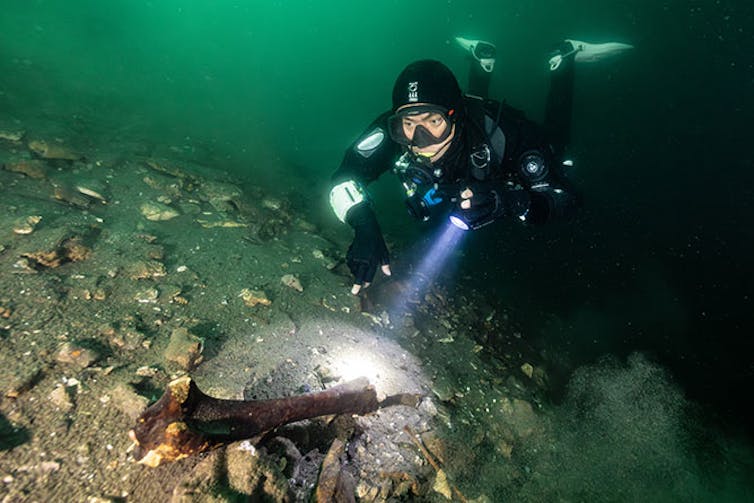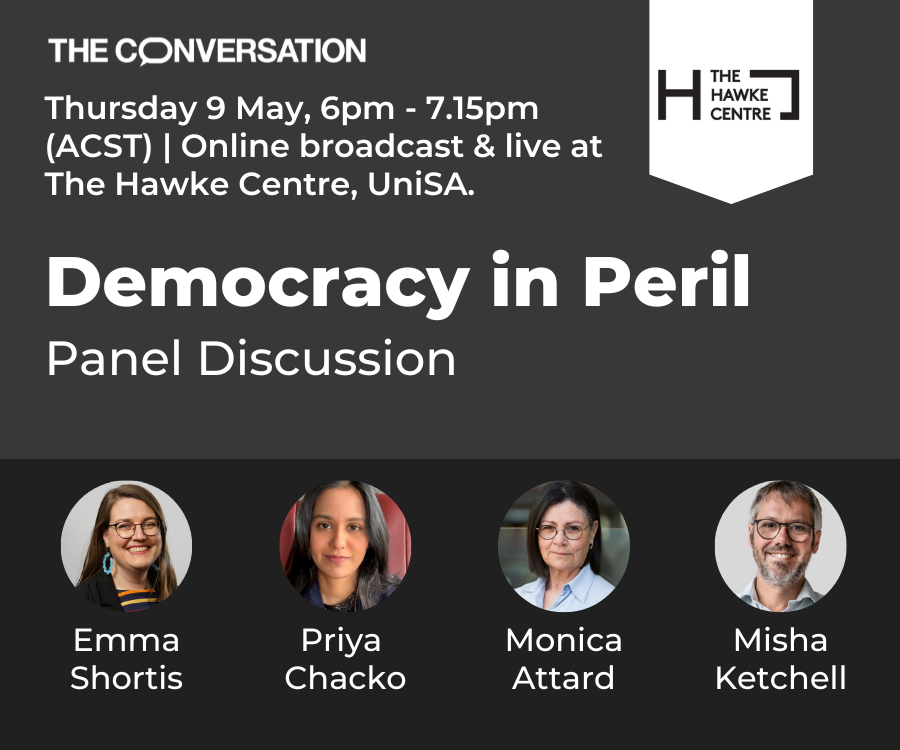|
The lush plains of the Limestone Coast in eastern South Australia conceal hundreds of underground tunnels and caverns. For millions of years, the ebb and flow of water from past ice ages has slowly carved out caves and sinkholes in the soft rocks, leaving behind a geological wonderland.
Today, brave humans explore these caves for fun. Tens of thousands of years ago, animals used them to shelter from the elements. This part of Australia was once home to many megafauna species – large wombat-like creatures, prehistoric kangaroo relatives with stumpy faces, and even marsupial lions. Now, all that remains of them are fossil bones.
Underwater caves are a fantastic place for preserving these fossils. Undisturbed by the elements, the remains are a treasure trove for the scientists who investigate why the megafauna went extinct. But these fossils are in deep caves. Underwater. Reaching them is not for the faint-hearted.
This is why palaeontologists from Griffith University teamed up with expert cave divers who have been exploring the region for decades. The result is a unique scientific collaboration that’s pushing the limits of the field. In collaboration with researchers Meg Walker, Joseph Monks and Julien Louys, our editorial web developer Matt Garrow has produced an immersive interactive feature that lets you take part in this incredible journey. Enjoy.
P.S. Next month our Editor Misha Ketchell will head to the Bob Hawke Prime Ministerial Centre in Adelaide to host a panel discussion, Democracy in Peril, that will explore some of the issues created by our infected information ecosystem. Featuring Monica Attard (UTS), Emma Shortis (RMIT) and Priya Chacko (University of Adelaide), the panel will explore the forces that, for good or ill, are reshaping modern democracies, especially in a year when more than 50% of the
world’s population will be voting in elections. It’s on May 9 and you can attend in person or online, so why not register
here.
|

|
Signe Dean
Science + Technology Editor
|
|
Interactive |
|---|
 Meg Walker, Joseph Monks and Julien Louys, The Conversation In this interactive story scientists have teamed up with cave divers on a unique mission to retrieve fossils of extinct Australian megafauna. |
|
Top stories
|

Anastasia Hronis, University of Technology Sydney
While for some, gambling might be a source of entertainment, for others, it can lead to significant harms.
|

Michelle Grattan, University of Canberra
The recent attacks in Sydney and the Israel-Gaza conflict have complicated the government’s plans for multicultural policy reform and heightened tensions within some communities.
|

Carol T Kulik, University of South Australia
In Australia, it’s not the done thing to know – let alone ask – what our colleagues are paid.
|

Brendon Hyndman, Charles Sturt University; Vaughan Cruickshank, University of Tasmania
Since COVID there has been an expansion in online options for school students. This includes individual classes and complete distance education.
|

Rowan Nicholson, Flinders University
Russia’s claims of self-defence are flimsy. You only have to breathe on them to knock them over. But would it be wise to try Putin in his absence?
|

Mark Wong, The University of Western Australia; Raphael Didham, The University of Western Australia
Sometimes it seems the night is just buzzing with insects. But are there really more insects out at night? We analysed all the evidence on insect activity across the day–night cycle to find out.
|

Tim Tenbensel, University of Auckland, Waipapa Taumata Rau
The Māori Health Authority is gone, but a law remains that puts primary focus on reducing health inequities – meaning the government may struggle to bridge the gap between rhetoric and policy priority.
|

Sofia Ammassari, Griffith University
New research examines the organisational reasons why Prime Minister Narendra Modi’s party has been so successful at winning elections since 2014.
|
Politics + Society
|
-
Peter Layton, Griffith University
The strategy takes the long view of how to build a high-spending, maritime-focused defence force of the future. But there are some shortcomings in the government’s vision.
-
Tim Harcourt, University of Technology Sydney
Steve Smith is the latest signing for the second season of Major League Cricket in the US. It’s another intriguing shift in the global cricket landscape.
-
Heidi Norman, UNSW Sydney; Anne Maree Payne, UNSW Sydney
Truth-telling is vital to building a greater understanding between First Nations and non-Indigenous Australians. New research offers insights into how this can be done.
|
|
Health + Medicine
|
-
Lisa Nicole Sharwood, UNSW Sydney; Rebecca Ivers, UNSW Sydney; Warwick Teague, Royal Children's Hospital
Has your child fractured a bone? A new report shows it’s the leading type of injury for kids. But the causes of injury change as children grow older and differ between boys and girls.
-
Di Winkler, La Trobe University; Jacinta Douglas, La Trobe University
Practical reforms are on the table when it comes to disability housing. But there are also potential traps that won’t promote choice.
|
|
Science + Technology
|
-
T.J. Thomson, RMIT University
There’s no escaping generative AI as it infiltrates our workplaces and daily lives. Learning what these tools can do will help you understand their full impact.
|
|
Environment + Energy
|
-
Salman Shooshtarian, RMIT University; Peter S.P. Wong, RMIT University; Tayyab Maqsood, RMIT University
Existing laws and regulations failed to prevent asbestos contamination of mulch. What’s missing is mandatory certification of recycled products so users can be sure they’ve been tested and are safe.
-
Madeline Taylor, Macquarie University
Made in Australia could be set for a comeback, if federal government promises materialise. But these localisation plans must work for the regional communities hosting new projects.
|
|
Education
|
-
Bronwyn E Wood, Te Herenga Waka — Victoria University of Wellington; Taylor Hughson, University of Cambridge
Key education policy decisions in the early 2000s have not produced the desired results. But broad bipartisan agreement is now needed to give children and teachers the greatest chance of success.
|
|
Books + Ideas
|
-
Jodi McAlister, Deakin University; Kate Cuthbert, The University of Queensland
Romance and fantasy have long been bedfellows. But thanks to BookTok, ‘romantasy’ is trending – online, in bookshops and on bestseller lists.
|
|
| |
|
|
|
The Conversation AU
Melbourne VIC, Australia
•
Full Time
|

|
|
|
|
| |
| |

|
| |
| |
| |
Featured Events, Courses & Podcasts
|
View all
|
|
|
|
| |
| |
| |
| |
| |
|
|